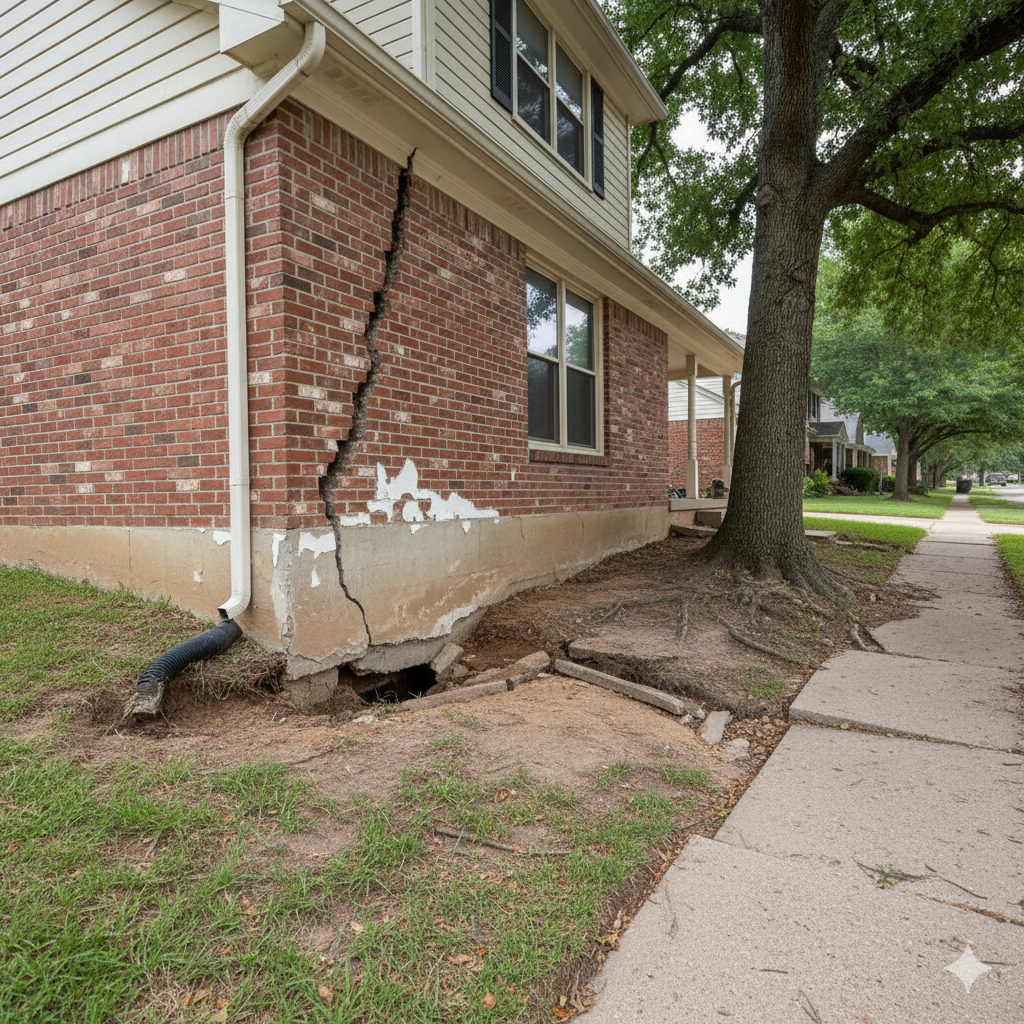Foundation Settling or Sinking Unevenly

If you’ve noticed uneven or sloping floors, doors that stick, or hairline cracks appearing around your home, you might wonder: Is this regular wear and tear, or a sign of uneven foundation settlement? At Appalachian Foundation Services, we are frequently asked these questions. Today, we want to help you understand what’s happening beneath your feet and how you can protect your home’s structural integrity.
⭐️⭐️⭐️⭐️⭐️
“Appalachian Foundation installed a long drain curtain in my backyard as well as buried my downspouts. Everything from the sales process to scheduling to performing the work was seamless and pain-free. I can’t say nicer things about the sales rep, Ryan, as he listened to my concerns and provided well-thought-out options. Cameron kept me informed about the start date which was great.
The crew that worked the job was great. They kept me informed about schedules, were very polite, and I could tell they were hard workers. Special shout-out to Sam for taking all my calls, answering my texts, sending me pics of the job as they worked through it, and answering all my questions. Would definitely recommend Appalachian Foundation!” – Nicholas Farmakis
Table of Contents
- What Exactly is Uneven Foundation Settlement?
- What Causes Uneven Foundation Settlement?
- Preventive Measures to Avoid Uneven Foundation Settlement
- Common Signs of Uneven Foundation Settlement
- Why You Should Seek Professional Advice Immediately
- How Is Uneven Foundation Settlement Repaired?
- When Should You Seek Professional Advice?
- Frequently Asked Questions About Foundation Settlement
- Protect Your Home’s Structural Integrity Today
What Exactly is Uneven Foundation Settlement?
While some uniform settlement is a regular part of a building’s life, uneven or differential settlement indicates soil movement that can threaten your home’s structural integrity. Your house rests on the soil beneath its foundation that supports its entire weight.
When this soil isn’t adequately compacted during construction or becomes disturbed over time—due to plumbing issues, shifting foundation soil, or erosion—different parts of your foundation can settle or sink unevenly. This uneven settling is known as differential settlement. The result? Uneven floors, walls that develop cracks, and doors and windows that stick or won’t close properly. If left unaddressed, this shifting foundation can lead to severe structural damage affecting your home’s safety and value.
What Causes Uneven Foundation Settlement?
A variety of factors can cause your foundation to settle unevenly, often related to the soil conditions beneath your home:
- Poor soil compaction during construction leaves weak soil unable to support the building’s weight correctly, causing uneven foundation shifts.
- Soil erosion from poor drainage, heavy rainfall, or water pooling washes away soil near the surface, leading to foundation sinking.
- Expansive soils, such as clay soil, swell and shrink dramatically with changing moisture levels, exerting uneven pressure on foundation walls.
- Large tree roots can disrupt soil moisture and physically push against foundation walls, causing foundation movement.
- Plumbing leaks and broken water lines saturate the soil, weakening its support capacity.
- Freeze-thaw cycles and natural soil movement cause ongoing foundation shifts in colder climates.
All of these contribute to the uneven settlement that can affect your entire building.
⭐️⭐️⭐️⭐️⭐️
“Hunter and his crew were amazing to work with. There was a horizontal crack in the foundation of our new (but very old) house, and Hunter came out promptly to give us an assessment of the damage and an estimate of the repairs. He and his crew were timely, communicative, and super professional. They answered all of our questions and addressed all our concerns! Would recommend them to anyone needing foundation work!” – Caroline Beatrous
Preventive Measures to Avoid Uneven Foundation Settlement
While some degree of differential settlement is common over time, taking proactive steps can help prevent serious issues with your building’s foundation and protect your home’s safety. Understanding the underlying causes of foundation settlement is key to prevention.
- Maintain Proper Drainage: Ensure water is directed away from your foundation through gutters, downspouts, and proper soil grading around your home. Standing water near the foundation can erode soil and lead to uneven settling.
- Manage Soil Moisture: Expansive soils expand and contract in response to changes in moisture, causing pressure on foundation walls. Avoid overwatering plants near the foundation and promptly repair any plumbing leaks to maintain balanced soil moisture.
- Control Tree Roots: Large tree roots can disrupt the soil beneath your foundation, causing movement and cracks in walls. Plant trees and shrubs a safe distance from your home to prevent root intrusion.
- Routine Inspections: Regularly check for early signs, such as cracked walls, sticking doors, or uneven floors. Early detection of differential settlement can help address problems before they escalate into severe structural damage affecting your building’s safety.
By addressing these factors, you reduce the risk of uneven foundation settlement and help ensure your home remains stable and secure for years to come.
Common Signs of Uneven Foundation Settlement
Early detection of foundation issues is crucial to prevent major structural problems. Here are some common signs to watch for:
- Hairline cracks or new cracks in interior walls, block walls, or foundation walls. Particularly concerning are stair-step cracks or diagonal cracks near windows and doors.
- Noticeable uneven or sloping floors, or visible gaps between walls, ceilings, and floors.
- Sticking doors or windows that no longer close properly due to shifting door and window frames.
- Bowing or bulging foundation walls or basement cracks, or foundation settlement.
- Uneven gaps around windows and doors, misaligned window frames, and doors and windows that stick.
- Visible slopes or noticeable slopes in floors indicate that the foundation sinks unevenly.
If you spot any of these signs, it’s essential to get a professional assessment before the problem worsens.
Why You Should Seek Professional Advice Immediately
Ignoring foundation issues can lead to serious and costly damage. As the foundation shifts, the entire structure may experience structural damage, including:
- Compromised structural integrity of your home.
- Worsening cracks that allow water intrusion, leading to mold and decay.
- Increased energy costs due to drafts from doors and windows that no longer seal properly.
- Potential safety hazards if the foundation settlement worsens without repair.
A professional assessment by a qualified structural engineer is essential to address foundation settlement before it escalates further. Relying on guesswork or DIY fixes can result in ineffective repairs and wasted money.
How Is Uneven Foundation Settlement Repaired?
-
Underpinning for Foundation Settlement
Using push piers, helical piers, or slab piers, these solutions transfer the building’s weight from weak or eroding soil to deeper, more stable layers, effectively stabilizing foundations and preventing further uneven settling. -
Foundation Leveling Services
Techniques such as mud-jacking or poly-jacking involve injecting a material beneath settled concrete slabs. For example, with poly-jacking, foam expands under the slab to lift and level it, filling voids caused by soil erosion or compaction. -
Crawl Space Foundation Repair
Addressing moisture and structural concerns in crawl spaces can reduce foundation movement and protect your home’s foundation from further damage. -
Resin Injections and Restumping
Non-underpinning repairs include sealing cracks with resin injections or replacing damaged stumps in older homes to correct foundation settlement issues.
When Should You Seek Professional Advice?
If you notice any typical signs of foundation settlement, or if you’re asking questions like:
- Why won’t my doors close properly anymore?
- Are cracks in walls a sign of foundation problems?
- What causes uneven foundation settlement?
It’s a good idea to schedule a professional inspection. A thorough evaluation will determine if your home is experiencing foundation shifts or just normal settling.
Frequently Asked Questions About Foundation Settlement
-
Why is my house foundation sinking?
Poor soil compaction, soil erosion, plumbing leaks, and expansive soils, such as clay, can cause uneven soil support, leading to your foundation sinking on one side. -
What causes uneven foundation settlement?
Uneven soil movement, poor construction quality, and environmental factors such as tree roots and soil moisture changes contribute to uneven foundation shifts. -
How can I tell if my foundation is settling?
Watch for hairline cracks, stair step cracks, sloping floors, doors and windows that stick, and gaps in walls or ceilings. -
Is it normal for a house foundation to sink?
Some uniform settlement is normal, but ongoing or uneven settling is a sign of foundation trouble. -
Can a sinking foundation be repaired?
Yes. Professional foundation repair methods, such as underpinning and leveling, stabilize the entire building and prevent further damage. -
How long can you wait to repair foundation problems?
Delaying repairs can worsen structural damage and increase costs. Early professional advice is critical.
Protect Your Home’s Structural Integrity Today
Your home’s foundation is literally the base that supports everything. Ignoring foundation settlement can lead to costly and serious problems down the road. If you’re concerned about uneven foundation settlement or notice any warning signs in your home, don’t wait.
Contact Appalachian Foundation Services for a professional assessment and trusted foundation repair solutions tailored to your needs. They specialize in diagnosing and fixing home foundation settlement issues to keep your home safe and stable.
Call (540) 251-4391 or visit their foundation repair page to learn more and schedule your inspection today!

